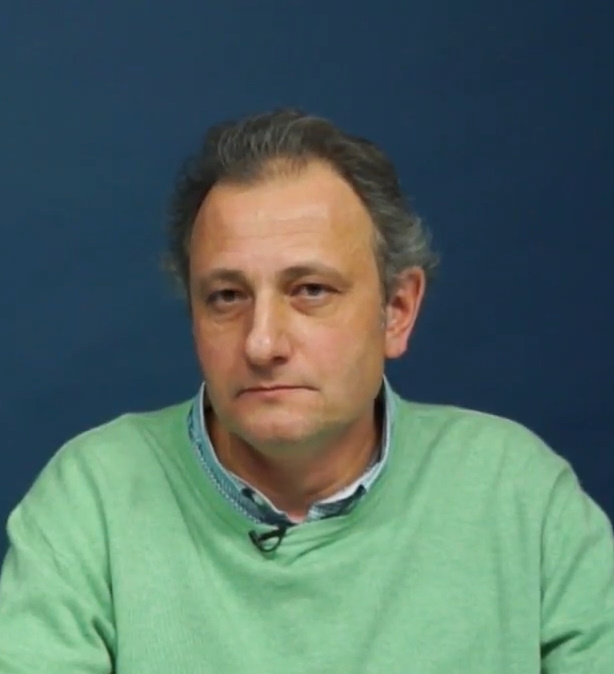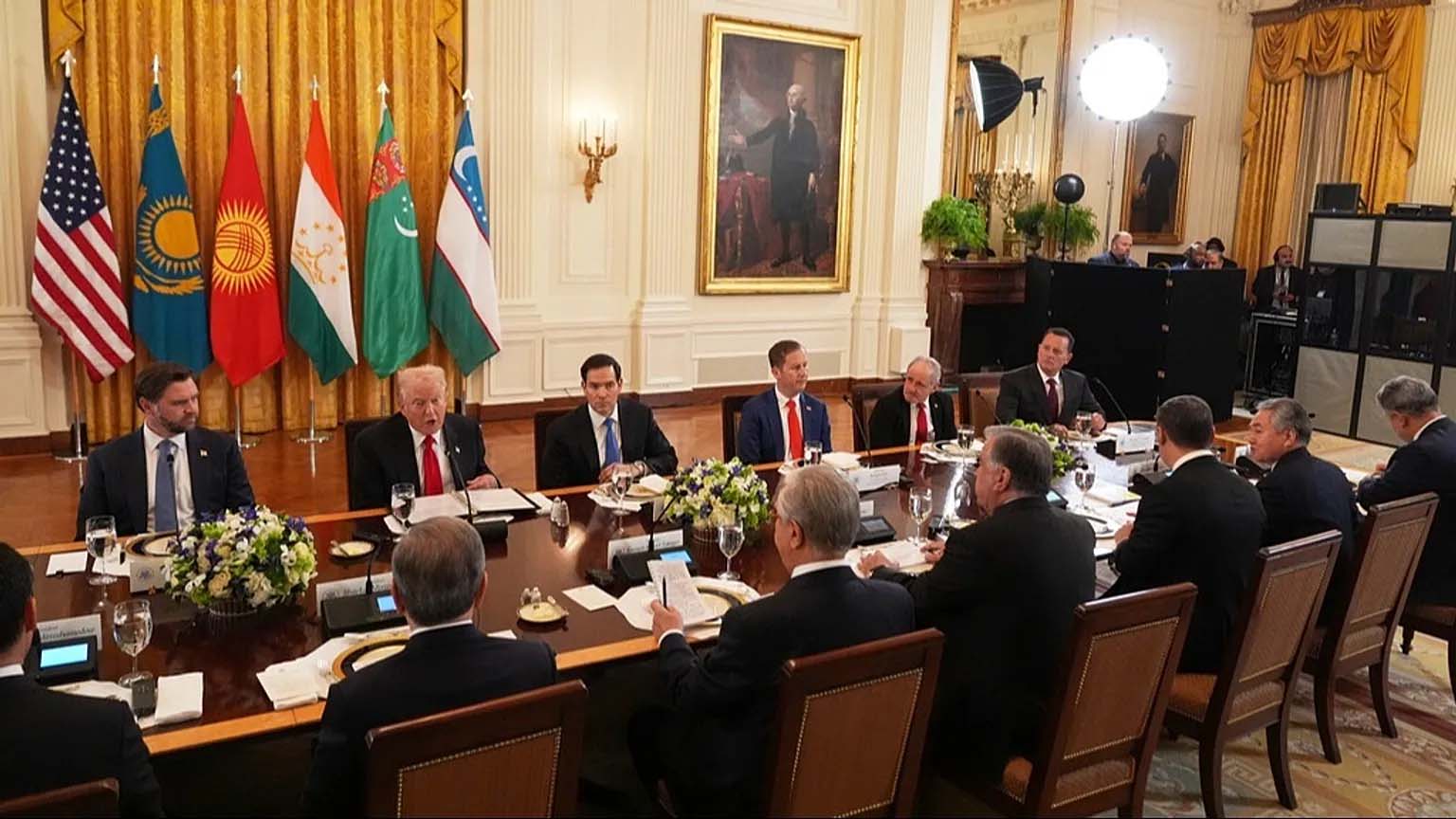 While the Kremlin was showing the world (from afar) the torso of 'Poseidon' and continued to teach the planet to pronounce the word Oreshnik instead of Sputnik and Perestroika, Trump used, no matter how you feel about him, a terrible secret weapon—soft power. And it struck right at the underbelly of the former empire, which cannot get rid of its imperial phantom pains—to such an extent that it began treatment for them in 2022 by isolating itself from the civilized world. The US President hosted the leaders of five Central Asian republics. And, as observers noted, these were no longer B2B contacts (businesses with businesses), but G2G (governments with governments). It is also important that Kassym-Jomart Tokayev, the President of Kazakhstan, felt like the birthday boy, timing his country's accession to the Abraham Accords (agreements of Muslim countries with Israel) with his visit to Washington.
While the Kremlin was showing the world (from afar) the torso of 'Poseidon' and continued to teach the planet to pronounce the word Oreshnik instead of Sputnik and Perestroika, Trump used, no matter how you feel about him, a terrible secret weapon—soft power. And it struck right at the underbelly of the former empire, which cannot get rid of its imperial phantom pains—to such an extent that it began treatment for them in 2022 by isolating itself from the civilized world. The US President hosted the leaders of five Central Asian republics. And, as observers noted, these were no longer B2B contacts (businesses with businesses), but G2G (governments with governments). It is also important that Kassym-Jomart Tokayev, the President of Kazakhstan, felt like the birthday boy, timing his country's accession to the Abraham Accords (agreements of Muslim countries with Israel) with his visit to Washington.
According to the Covenants of Abraham
There was a feeling that the globe had shifted slightly away from Putin. But he himself said that the world is now multipolar, and Kazakhstan has moved to one of the many poles. After all, Tokayev has to maneuver in the Russia-China-USA triangle, and he naturally does not neglect the American pole—both economically and politically. This can hardly please not so much the pole as the 'navel of the earth,' located 'behind the crenellations' of the Kremlin wall, but what can you do: you shouldn't tell Kazakhs through the mouths of various propagandists and deputies that 'Northern Kazakhstan is ours.' In diplomatic defeat, even the darling of all the world's leftists—Hamas, whose representatives expressed that Kazakhstan's accession to the Abraham Accords is 'unacceptable.' In the human community, something else is unacceptable, for example, the harshest years-long terrorist activity, and in this sense, the Kazakh side has taken the ethically correct side of history.

Trump received the presidents of 5 Central Asian countries in Washington. Photo: Jacquelyn Martin / The AP
As for Putin, after Russia and the USA compared the sizes of their nuclear power, he could only deliberately focus on the internal agenda. Since the meaningless photo session with Trump in Budapest's cityscapes fell through, it was necessary to urgently inform the population about the importance of developing the torso not only of 'Poseidon' (meeting of the Council for the Development of Physical Culture and Sports); to speak at the international (!) forum 'Russia - a Sports Power' (recalling the hosting of the World Cup in Russia in 2018, as if nothing had happened since then, although 'geopolitical contradictions' were mentioned); to hold a meeting of the Council on Interethnic Relations (the Special Military Operation was called 'an example of genuine interethnic unity', as well as 'victory over intervention and turmoil' in the 17th century); met with the new Chairman of the Supreme Court Krasnov.
There were important initiatives. And varied—from the mandatory raising of the flag during youth competitions to the establishment of a Day of Court Workers along with the 'revival of domestic traditions of justice.' If they mean the experience of political processes of the Stalinist and post-Stalinist times, cases of applying Article 58 of the old code and Articles 70 and 190 of the 1960s code, then, undoubtedly, these 'traditions' have already been 'revived.' Moreover, even on a larger scale than in the late Soviet times.
'Where is Lavrov?'
And somehow there were no events on the foreign policy track, despite the fact that Kremlin-subordinate friends from the imaginary Putin empire were obsequiously smiling at the US President. The most cynical observers asked a short question: 'Where is Lavrov?'
The minister was not at the Security Council meeting on November 5, when confused security officials proposed nuclear tests on Novaya Zemlya and complained that they could not find out anything from the Americans—the head of the Foreign Intelligence Service Naryshkin, who was again found to be the scapegoat, as before the start of the Special Military Operation, told that the American officials requested by the Russian side did not know anything. Lavrov 'was agreeably absent' (a good formula, worth remembering and applying in various life situations). Meanwhile, in the Ministry of Foreign Affairs itself, judging by its news feed, Lavrov was noted only with welcoming words to two forums, the names of which are forgotten a second after reading; as always, spokeswoman Zakharova dominated.
The physical image of the minister appeared only on November 1, where he talked about his friendly relations with TV presenter Yuri Nikolaev, who conveyed the 'spirit of kindness,' 'especially since it is so important from the point of view of preserving the tradition of our people.' It was important to add about traditions, as well as about kindness—this quality is inherent exclusively to the Russian people and no other. We know, we read in the article by Kremlin official Alexander Kharichev this same week. By the way, Yuri Nikolaev died a few days after this interview, and on November 5, condolences from the minister to the family and friends appeared on the Ministry of Foreign Affairs website. In short, the Ministry of Foreign Affairs of the Russian Federation spent the whole week dealing with the former host of the TV program 'Morning Mail.'
For some reason, in off- and online discussions, it became common to say that Minister Lavrov failed the conversation with Secretary of State Rubio, which is why the summit meeting in Budapest did not take place. And the minister fell into disgrace. But Lavrov did not fail anything, he repeated the same mantra about 'root causes' (speaking in English—'root causes') and clearly indicated that Putin does not intend to stop the Special Military Operation unless the entire Donbas is handed over to him. The formula 'ceasefire—freezing the line of contact—negotiations in the conditions of a frozen status of territories on both sides of the line', which already suited Trump, did not suit Moscow. What, in fact, did the minister do wrong?
Trump simply got tired of being a piece of furniture in photo and video sessions with Putin, and since the Russian autocrat intends to continue the Special Military Operation, there is no point in meeting. After all, Trump is not the governor of the Tver region, but the 47th President of the United States of America, one can understand the man. But the fact remains—Lavrov has not appeared for a long time, and the network insider decisively concluded: the minister is on the verge of resignation. Since the times of Jesus Christ, as NATO head Mark Rutte said, Lavrov has served as minister and suddenly—disgrace? For expressing the official position? Something is wrong here, but what is right, no one knows. But such is Putin's policy—quite Byzantine, it is also our spiritual value, sealed with a (small) cultural code.
Collapsed Italy
The matter is not in Lavrov. And not even in diplomacy itself, which has not been needed in its classical form for several years now, because its function is to build and maintain peace and soft power, which is now completely unnecessary. In the circumstances of the Special Military Operation, the diplomatic institution turns into another press service of the Kremlin, speaking in the dialect of hatred and predicting the collapse of countries on the scale of Italy. Mrs. Zakharova followed in the footsteps of Khrushchev, who in a fit promised to 'bury' America, but at the same time, Nikita Sergeyevich was still the head of state, and diplomatic efforts and negotiations on various occasions did not stop. And so the verbal interventions of the Ministry of Foreign Affairs become the verbal version of the revealing cartoons of Kukryniksy and Boris Efimov. This can hardly be called diplomacy. Rather, the Ministry of Foreign Affairs signs off on the complete degradation of communication channels with truly significant countries. With all due respect to the 'multipolar world,' relations with the same Italy could still be mutually beneficial. Remember at least the first 'Zhiguli' car, also known as Fiat... But after Zakharova's words: 'As long as the Italian government senselessly spends its taxpayers' money, Italy will collapse entirely: from the economy to the towers,' perhaps the prospects for B2B and G2G cooperation with the Italian Republic will be striving towards zero for many years to come.
The situation is absolutely deadlocked. Putin, as he was generally satisfied with everything, remains in quite a cheerful mood, believing that the population has enough resources of patience, and economic problems only haunt Europe. Verbal and legislative fuses have finally burned out, and discussions about 'collapsed Italy' and planned exotic decisions like depriving 'foreign agents' of pensions and disconnecting mobile internet for citizens returning from abroad to Russia will only multiply. Because the existing experience suggests that the majority of the population, within the framework of learned helplessness, will accept everything as a given and respond to any challenge with adaptation. Ordinary Russians, including those persecuted by the Kremlin regime, are responsible for Putin's policy. Bank sanctions against Russians, the cancellation of Schengen multi-visas—all this already concerns the ruling class little, but significantly limits the rights and opportunities of ordinary Russian citizens, including stimulating support for Putin. Any meaningful negotiations on Ukraine—with or without Lavrov—seem like an unrealizable scenario in this context.
The Special Military Operation remains the usual backdrop of life and a way of existence for the political regime. Citizens slowly tighten their belts under the turned-on TV.
* The Russian Ministry of Justice considers Andrey Kolesnikov a 'foreign agent.'